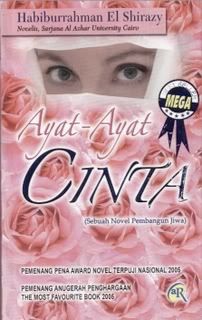
AYAT-AYAT CINTA by Habiburrahman El Shirazy (Al-Hidayah Publishers, 2008, 510 pages)
This is actually the Malay version of an Indonesian novel that has sold over 200,000 copies since its release in 2004. It was then made into a film that was seen by over 2 million people.
Why was it so successful? Perhaps the cover provides a hint. The shocking pink may not seem unusual in the novel cinta genre, but the author’s academic credentials are: he is a graduate of Egypt’s Al-Azhar University. That’s like a secular writer saying he came from Oxford or Harvard: it inspires immediate confidence.
The novel is indeed set in Egypt, and follows an Indonesian student of Al-Azhar named Fahri, and is narrated in the first person. He’s never physically described but he might be hot stuff, since women are quite literally dying for his lurve – but you’d need to read to the end to find out how.
The title means Verses of Love and the verses are most decidedly divine: the Quran, examples from the Prophet, and other signs of God’s greatness. These are liberally sprinkled through-out the text. Fahri and his friends seem to always have the right verse for each occasion. None of them is the dating kind: romantic love is seen as just one of the many paths to express the transcendent love for God. (At the risk of sounding crass, you can even say that this book uses Islamic verses the way a Western chick-lit book uses couture labels: to provide comfort and guidance. )
Its protagonists inhabit a totally different epistemological universe than you might be used to. Collete once said: “Without adultery, there is no novel.” Meaning, I presume, that novels are usually about breaches of social rules. But Fahri not only never commits adultery, he refrains from even holding a woman’s hand until after his wedding. Heck, he only sees her face after agreeing to marry her; he agreed because his religious elders couldn’t possibly have made the wrong choice for him, could they?
But all that takes place in the second half. The first section is more like a campus novel. We follow him as he prepares his thesis and does translation jobs. There’s lots of hurrying about on the metro system. The blistering heat and dust of Cairo are evoked well; you feel like taking a long, cool bath after each chapter. The prayer times are always there as reminders of his first duty. He’s a conscientious bloke with a 10-year academic and professional plan, and there’s no time to waste.
We are introduced to a few women around him: Maria, a Coptic Christian neighbor; Nurul, a fellow Indonesian; Noura, who is being abused at home; and Aisha, who is of Turkish-German parentage and visiting Cairo partly to brush up on her Arabic.
There’s also Alicia, an American journalist who wants to find out if Islam discriminates against women and non-Muslims. Fahri is so hard-working that he writes her a 40-page answer, and gets Maria to translate another book of over 100 pages. The novel has a few references to Malaysian students at the same university; I can only hope for the sake of national pride that they are similarly rajin, but we never find out much about them.
There is not much incident at first but it’s immensely engaging; its didacticism blends rather than grates. Then Fahri gets heat stroke and dreams of meeting one of the Prophet’s companions. This marks a significant turning-point in the novel’s style: the second half lurches into melodramatic overdrive.
He gets married. Then not one, not two, but three other women profess that they’ve always loved him. (There’s a lot going on under those purdahs.) What’s a poor guy to do? For a moment I thought he would just marry all of them, but Fahri is not that kind of guy. He gets arrested and tortured on a trumped-up charge. Someone almost rapes his wife. Another woman slips into a coma. There is a trial, and his wife faints in court.
Straining for pathos, the final sections ditch the pleasurable dignity and restraint of the beginning. There’s a deathbed denouement that I am sure will make some people hear angels, but it unfortunately brought to mind Oscar Wilde’s quote on a Dickens scene: “You’d need a heart of stone not to laugh.”
I don’t have the original Indonesian with me, but I don’t think many changes were made. I am sure words that would have provoked unintended guffaws, like butuh and pantat, have been changed to perlu and punggung. Other than that, many Indonesian terms have survived, to the extent that percuma, lucu, and budak are left in where a Malay reader would expect sia-sia, comel and hamba.
The Malay version is now in its 11th edition and has inspired a host of imitators. Truly, it has been blessed.
(Malay Mail, 18 February)
3 comments:
You are addicted to romantic novels, arent you? just admit it.
My mom has the Indonesian version I bought for her. She loved it. Pi la pinjam.
I ain't messin wit yo mama.
Post a Comment